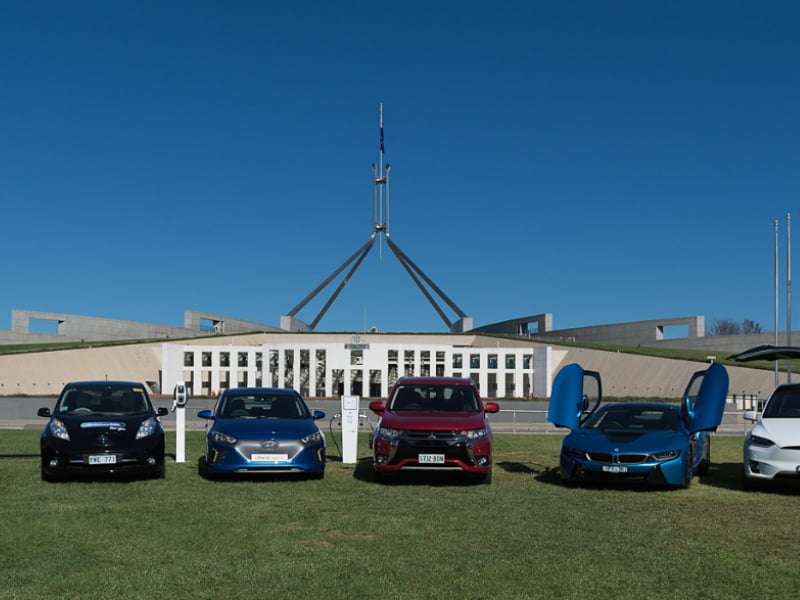The federal government will not put in place any electric vehicle subsidies, mandates or targets as part of its newly unveiled EV strategy, which the chief executive of a leading industry association says includes “only about 5 per cent” of what’s needed.
Prime Minister Scott Morrison launched the ‘Future Fuels and Vehicles Strategy‘ in Melbourne on Tuesday morning, with $178 million in new funding for electric vehicle charging stations and infrastructure.
It comes less than three years after Mr Morrison attacked Labor’s electric vehicles policy, including a target of 50 per cent of new car sales being electric by 2030, as bringing about the “end of the weekend”.

The Coalition’s new EV strategy does not include any new subsidies for the purchase of electric vehicles, and does not implement any mandates or targets for the sale of these vehicles. It does include an expectation that 30 per cent of new car sales in 2030 will be electric.
Most of the new funding in the strategy goes towards EVs and hydrogen refueling infrastructure and assistance for business in setting up charging stations for EVs. The government will be co-invest with the private sector to roll out about 50,000 new smart chargers in Australian houses, while the Future Fuels Fund will be pumped up to $250 million in total.
The fund is focused on public electric vehicle charging and hydrogen refueling infrastructure, heavy and long-distance vehicle technologies, commercial fleets and household smart charging.
Mr Morrison positioned the strategy as giving Australians the option of embracing electric vehicles, rather than forcing them on individuals.
“The cost of the technology is coming down and that means the choices that are available to Australians are becoming more accessible. Our plans are all about supporting those choices, facilitating those choices and plugging gaps where they need to be plugged,” Mr Morrison said on Tuesday.
“Our plan doesn’t tax you, it doesn’t force you to do anything, it doesn’t pass laws that try to drive you out of any industries, it actually backs Australians to get this done because we know they want to get this done.
The government’s plan isn’t close to what’s needed to drive electric vehicle uptake in Australia, Electric Vehicle Council chief executive Behyad Jafari said.
“What’s in the policy is okay, but overall the policy is far too little too late. It’s a policy that addresses about 5 per cent of what needs to happen to support EVs,” Mr Jafari told InnovationAus.
“The two big pillars of it – fuel efficiency standards and rebates to make EVs cheaper – have been ruled out by the government. Those are the two most effective things around the world that our government is saying it’s not going to do. So then the only option is to fiddle around the edges.”
While the government has positioned its strategy as giving Australians the choice on EVs, Mr Jafari said it is actually doing the opposite.
“That’s purely spin by the government. The car industry and experts have told them repeatedly that regulations increase choice for consumers because they force car companies to bring the latest and greatest technologies to this country in order to avoid fines,” he said.
Australia will fall even further behind the rest of the world on EVs with this strategy, he said.
“We’re already a dumping ground for older, less efficient vehicles and that will continue to be the case. The rest of the world will move on while Australians are left paying more at the pump because we haven’t got the right leadership,” Mr Jafari said.
“We’ve got some hope that we’ve started to see state governments stepping in to fill the gaps. Unfortunately they can’t do everything that a federal government can do. Other countries are constantly accelerating their efforts, and every time that happens we fall further behind.”
Labor took a target to the last election of having half of all new car sales by 2030 by electric vehicles. This led to a hyperbolic scare campaign by the federal government, led by Mr Morrison, that this would lead to the end of the weekend.
Mr Morrison was repeatedly asked about his previous comments on EVs by the media, and he refused to back down.
“I don’t think their policy was a good policy. I still don’t think it’s a good policy. Labor wants to tell everybody what to do and what cars to drive. I think Australians have had enough of governments telling them what to do,” he said.
“I trust Australians that when they’re presented with good options at good prices, they’ll make good choices. I don’t have to tell them to get rid of the car they have now, that’s what Labor wants to do. I don’t regret opposing Bill Shorten’s policy.”
Labor’s 2019 policy was merely a target, not a mandate for car sales. The Opposition is not pursuing this target anymore, but has announced a series of tax concessions for the purchasing of EVs worth less than $77,565 should it win the upcoming election. These include a cut to the import tariff on EVs and a fringe benefits tax exemption.
On Tuesday, Mr Morrison attempted to portray subsidies or tax concessions as serving to “send taxpayers money to multinationals”.
A number of state governments – both Labor and Liberal – have introduced a number of electric vehicle subsidies and other efforts to drive their uptake.
The Victorian government has announced $100 million in funding to accompany its 50 percent target of new car sales by 2030, including 20,000 subsidies of up to $3000 for new EVs worth less than $69,000, and $19 million for charging stations.
The New South Wales government has revealed a $480 million package, also including $3000 rebates and deferral of its planned road user tax for electric vehicle owners.
Do you know more? Contact James Riley via Email.

